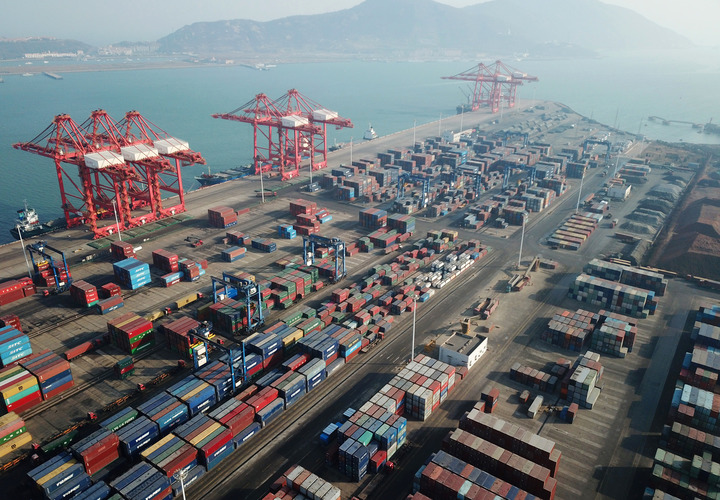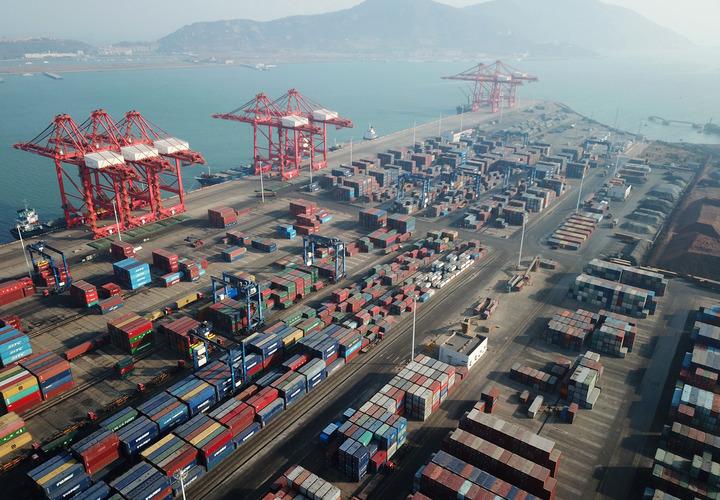
Aerial photo taken on Jan. 14, 2021 shows the container terminal of the Lianyungang Port in Lianyungang City, east China's Jiangsu Province. (Photo by Geng Yuhe/Xinhua)
BEIJING, March 23 (Xinhua) -- China's foreign direct investment (FDI), in actual use, expanded 37.9 percent year on year in the first two months of this year, the latest data from the Ministry of Commerce (MOC) showed.
During the same period, it was highlighted that the high-tech industry had a year-on-year growth rate of 73.8 percent of the FDI in actual use, as the high-tech manufacturing industry surged 69.2 percent year on year while the high-tech service industry hiked 74.9 percent over the same period last year.
--Stable FDI utilization
Affected by the COVID-19 pandemic and the adjusted layout of industrial and supply chains, the global transnational investment experienced great volatility over the past years. Nevertheless China bucked the trend and maintained the stable growth of foreign capital utilization.
According to official statistics, the global FDI rebounded strongly last year, up 77 percent from 2020. China's FDI hit a record high of 173.48 billion dollars in 2021, up 20 percent year on year. "It should be noted that in the context of abundant global liquidity, foreign investors intended to find more favorable destinations", said Sang Baichuan, Director of the Institute of International Business of the University of International Business and Economics (UIBE) in Beijing.
"China maintained a rapid growth of the actual utilized foreign capital in the high-tech industry since the beginning of this year, showing that China remains one of the most important destinations for global investment", said Liu Xiangdong, Deputy Director of the Economic Research Department of China Center for International Economic Exchanges (CCIEE), adding that despite the complex international situations, China presented upward momentum of economic recovery with more positive factors over the first two months of this year.
Noting the main factors of China's high-tech industry is favored by foreign investors, experts hold that the fundamentals for long-term economic growth, the good resilience, potential and space of economic growth, the momentum of stable economic recovery, transformation and upgrading, and also the favorable conditions for creating a new development pattern for high-quality development remain unchanged in China.
In addition, China has rolled out preferential regulations and policies such the Catalog of Encouraged Industries for Foreign Investment, while the local governments play a significant role in drawing sufficient attention to and releasing supporting policies for optimizing their foreign investment structure.
Gao Feng, Spokesman of the MOC said that, China presently relaxes market access, shortens the negative list of access for foreign investment, improves the administration system of pre-access national treatment plus negative list, promotes all-round opening-up of agriculture and manufacturing, and orderly opens up the service industries like telecommunication and medical sector.
Gao added that China expands the scope of encouraged foreign investment, improves the quality and level of foreign capital utilization and the service system for foreign investors, and creates a market-oriented and law-based internationalized business environment.
--Promising future of economic transformation
As foreign investment constantly flows to the high-tech industry, "it indicates the optimized structure of foreign investment and the improved investment quality in China ", said Zhao Beiwen, Deputy Director of the Institute of World Economy, Shanghai Academy of Social Sciences, who added that the foreign investors pay more attention to the high- and new-tech sector and the investment increases rapidly in the manufacturing industry.
China gained certain achievements in industrial transformation and upgrading with an optimized economic structure and a prominent trend of growth driven by innovation over the past several years. So far the high-tech manufacturing sector has turned out to be a pillar that leads industrial transformation and high-quality development.
Data from the National Bureau of Statistics (NBS) showed that China's added value of high-tech manufacturing above the designated scale grew by 14.4 percent year on year in the first two months of this year, and the investment in high-tech manufacturing soared by 42.7 percent, significantly higher than the growth rates of the production industry and investment to the manufacturing industry as a whole.
During the January-February period this year, China's production index of information transmission, software and information technology services increased by 16.3 percent year on year over the first two months this year, apparently higher than the composite production index of the whole service industry. "This is the fast growth on the basis of the big base last year", noted Fu Linghui, Spokesman of the National Bureau of Statistics (NBS).
The accelerated growth of FDI in the high-tech industry was closely associated with the faster economic transformation and upgrading in China over the first two months this year, according to Sang Baichuan, adding that China has made significant progress in the innovation-driven development, and the country has formed a synergy of innovation-driven development.
Sang Baichuan added that the multinational corporations (MNCs) are also optimistic about the future of China's economic transformation and upgrading, and thus increase their investment in the Chinese high-tech industry. The MNCs hope to share the benefits of China's economic transformation and upgrading together with their Chinese peers.
"As long as the policies are implemented and maintained consistent, the foreign investment in the high-tech industry will be expanding at a high growth rate, and thus propel the high-quality economic development in China", added Liu.
-- Foreign investment structure optimized by innovation
This year, the government work report proposed implementing the negative list and national treatment of foreign investors, expanding the scope of encouraged foreign investment, and supporting the foreign investment in the medium- and high-end manufacturing, research and development, modern service, and other fields.
In recent years, China has significantly strengthened the capability of attracting foreign investment in line with its overall economic growth. In general, during the process of economic transformation and upgrading, the proportion of the service industry is constantly expanding while the growth of the manufacturing industry slows down. The extensive growing mode of manufacturing has come to an end that causes the changes of investment opportunities.
It is noted that more transitional companies including manufacturers relocate their regional headquarters and Research and Development (R&D) centers to China while a big portion of investment in the service industry goes to the medium- and high-end manufacturing.
In addition, as the manufacturing transformation and upgrading speeds up, more manufacturers are outsourcing their services of logistics, accounting, legal, and transport. Those new investment opportunities of manufacturing business will rely more on innovation while the investment attraction pattern needs to be adjusted accordingly.
China strives to strengthen the support for manufacturing to attract foreign investment. Not long ago, ten national departments, including the Ministry of Industry and Information Technology, jointly released the Guiding Opinions on Promoting Orderly Transfer of Manufacturing Industry, aiming to optimize the spatial layout of production capacity, coordinate regional development and explore new space for manufacturing development. It creates favorable conditions for the growth of foreign investment in central and western China.
According to Zhang Fei, Deputy Director of Foreign Investment Research Institute of the Chinese Academy of International Trade and Economic Cooperation (AITEC), to increase both scale and proportion of utilized foreign capital of the manufacturing industry in the Chinese economy, China should encourage foreign manufacturing enterprises to expand their investment while fully leveraging state-level economic and technological development zones' role as favorable platforms to foster better business environment locally.
Zhang added that China should make more coordination efforts to overcome obstacles incurred in opening-up and foreign capital utilization, especially problems incurred by foreign-funded manufacturing entities in China, together with foreign associations and chambers of business. (Edited by Jiang Feifan with Xinhua Silk Road, 346129473@qq.com)




 A single purchase
A single purchase









